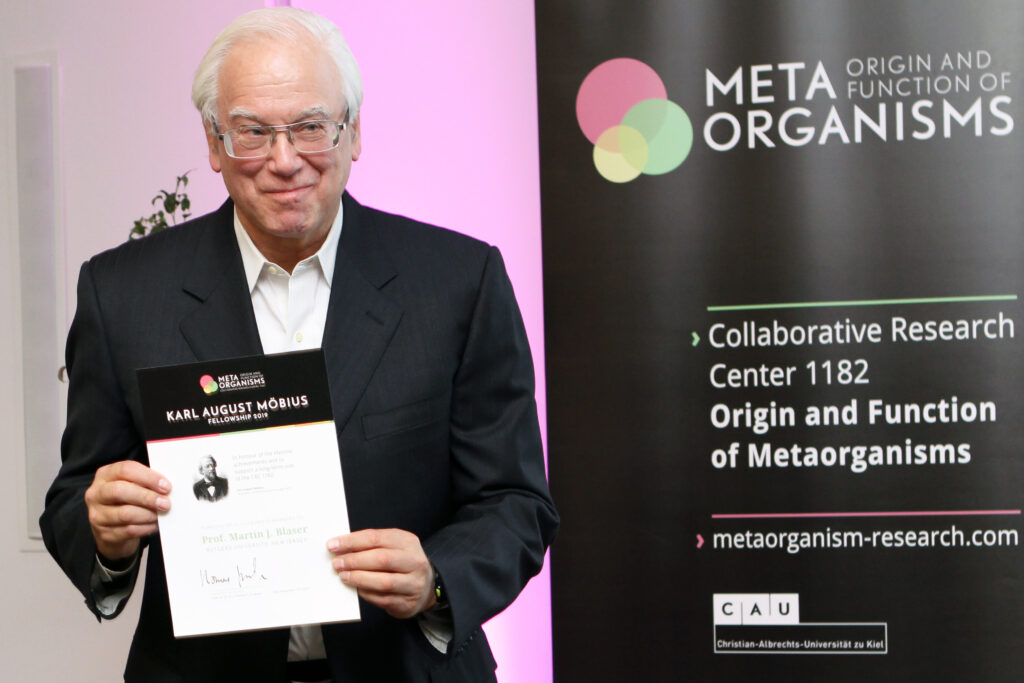Kiel Conference: Fungi and their role in the microbiome
Symposium “Fungi – the forgotten component of metaorganisms” of CRC 1182 and Kiel Plant Center focuses on the involvement of fungi in the interactions between microorganisms and multicellular organisms
• Conference at Kiel University brings together around 60 fungi experts from various disciplines of microbiome research.
• Fungi have so far been regarded primarily as pathogens, and their significance in the context of the entire microbial colonisation of the body has been little researched.
• In future, researchers at Kiel University and partner institutions want to increasingly investigate the effects of fungi on the functions and health of host organisms.
Today and tomorrow, the international symposium “Fungi – the forgotten component of metaorganisms” takes place at Kiel University. The conference brings together scientists from Kiel and international experts to exchange their research on the involvement of fungi in the microbial colonisation of multicellular host organisms. While, for example, the role of bacteria as causal factors for certain physiological functions of host organisms or even the development of disease is well researched, fungi have been neglected in this respect until now. With this conference, scientists from different fields of research will address the role of fungi in the microbial colonisation of different organisms, including humans and the consequences of their interactions with the host organism.
To this end, the conference brings together experts from research disciplines such as medical mycology, plant pathology and fungal genetics, who contribute to research into the diversity, function and communication of fungi in different host organisms. The conference, jointly held by the Collaborative Research Center (CRC) 1182 “Origin and Function of Metaorganisms” and the Kiel Plant Center (KPC), is jointly organised by Professor Eva Stukenbrock and Professor Thomas Bosch. The event is inspired by the “Fungal Kingdom” research program of the Canadian Institute for Advanced Research (CIFAR); Stukenbrock and Bosch are both part of this renowned international institution as CIFAR Fellows. The European Union-funded collaborative project “SymbNET – Genomics and Metabolomics in a Host-Microbe Symbiosis Network”, to which the CRC 1182 contributes, is also involved. “The aim of our symposium is to exchange our experiences and knowledge across disciplinary boundaries and to discuss how we can jointly research the role of fungi in animal and plant metaorganisms more intensively in the future,” emphasises cell and developmental biologist Bosch, spokesperson of the CRC 1182.
Overlooked component of the microbiome
For many years, scientists have compiled numerous details about the interactions of multicellular host organisms with the totality of microorganisms living in and on their tissues, the so-called microbiome. Today, many details of the molecular interactions between hosts and microbes and their physiological effects are known. Recently, various fungal species have also been increasingly identified as common and important members of the microbiome, which also have an impact on the health and disease of the host organism.
“With our conference, we want to focus on the current state of research and address, for example, the diversity of fungi within the microbiome and how this diversity can be best characterised. The meeting will address how fungi interact with the host immune system,” explains Stukenbrock, head of the Environmental Genomics working group at Kiel University’s Botanical Institute. “There are more and more indications that the diversity and role of fungi is changed when the host organism is diseased. We want to pursue these aspects and other interesting research questions in the future and gradually expand our knowledge about fungi as important components of a metaorganism,” emphasises KPC spokesperson Stukenbrock.
Microbiome research focusing on fungi
So far, fungal research has been interested particularly in opportunistic diseases caused by fungal species. However, recent research also points to connections between fungi and other members of the microbiome, especially bacteria. It is possible that these regulate each other and thus contribute to a balance of the microbiome in a healthy state. During the event, the participants will present how such interactions probably take place within the microbiome. For example, Professor Marie-Claire Arrieta from the Canadian University of Calgary will demonstrate how fungi within the microbiome are related to the formation of the immune system in infants. Professor Bart Thomma from the University of Cologne will present his work on plant-pathogenic fungi that can influence the microbiome of their host plant to facilitate fungal infection.
The current meeting also represents a central part of the CRC 1182, which deals with the plant-associated microbiome and its role in the adaptation of plants to various environmental conditions and pathogens. The DFG-funded Collaborative Research Center is currently preparing for a third funding phase and has the best chances of successfully continuing its research programme, which is unique in Germany, from next year on. Research into fungal pathogens is also of particular importance in the Kiel Plant Center, the association of plant researchers in Kiel. One of the goals of the KPC is to develop better plant protection strategies against harmful fungi in the future and thus promote plant health and food security.
About Kiel Plant Center (KPC): The research centre aims to promote the diversity of plant research at Kiel University and its partner institutions. Under the umbrella of the university priority research area Kiel Life Science (KLS), it provides a platform for interdisciplinary exchange and creates the framework for developing new research initiatives. The Kiel Plant Sciences comprise research groups from numerous faculties and institutes dealing with a wide range of research questions from molecular plant biology, plant ecology, biotechnology to plant breeding. The common focus of the scientists involved is particularly on plant health and the interactions of plants with their environment.
Contact:
Prof. Thomas Bosch
Spokesperson CRC 1182 „Origin and Function of Metaorganisms“, Kiel University:
Phone: +49 (0) 431-880-4170
Email: tbosch@zoologie.uni-kiel.de
More information:
Kiel Plant Center (KPC), Kiel University:
www.plant-center.uni-kiel.de
SymbNET, Instituto Gulbenkian de Ciência, Oeiras:
symbnet.eu
Research Program Fungal Kingdom, Canadian Institute for Advanced Research (CIFAR):
cifar.ca/research-programs/fungal-kingdom
Priority Research Area “Kiel Life Science”, Kiel University:
www.kls.uni-kiel.de/en





